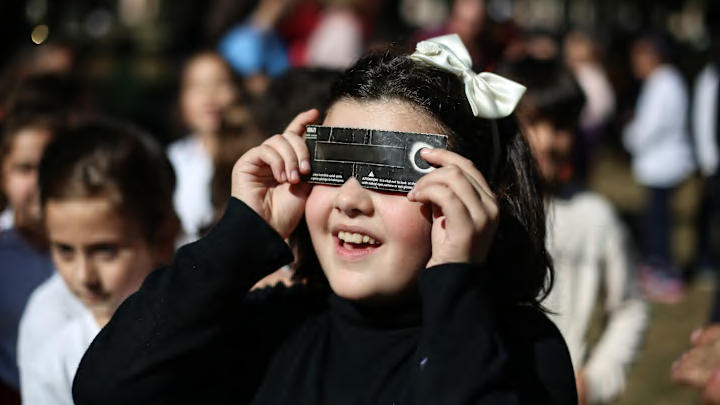A total solar eclipse will cut a path of totality across the United States on April 8, 2024, and eclipse mania is gripping the country. Should the wide-eyed and unprotected hazard a peek at this rare phenomenon?
NASA doesn't advise it. The truth is, a quick glance at a solar eclipse won't leave you blind. But you're not doing your eyes any favors. As NASA explains, even when 99 percent of the sun's surface is covered, the 1 percent that sneaks out around the edges is enough to damage the rod and cone cells in your retinas. As this light and radiation flood into the eye, the retina becomes trapped in a sort of solar cooker that scorches its tissue. And because your retinas don't have any pain receptors, your eyes have no way of warning you to stop.
The good news for astronomy enthusiasts is that there are ways to safely view a solar eclipse. A pair of eclipse glasses will block the retina-frying rays, but sunglasses or any other kind of smoked lenses cannot. The American Astronomical Society also suggests watching the eclipse indirectly through a pinhole projector, or through binoculars or a telescope fitted with special solar filters.
While it's safe to take a quick, unfiltered peek at the sun in the brief totality of a total solar eclipse—for which you must actually be in its path of totality— doing so during the partial phases when the moon is not completely covering the sun is a risk you don’t want to take.
Is It Safe for Kids to Watch the April 8 Solar Eclipse?
The 2024 solar eclipse’s path of totality will go right across Arkansas, and the Arkansas Children’s Hospital advises that it’s OK for kids to witness the eclipse, with a couple caveats. Parents and caregivers must supervise their children at all times and the kids must wear certified eclipse glasses throughout the event, pediatrician Dr. Laura Sisterhen said in a statement. Adults should also explain the dangers of incorrectly viewing a solar eclipse and make sure youngsters understand safety precautions. For that reason, Dr. Sisterhen recommends that kids who are preschool-age and younger not participate.
But that doesn't mean they can’t experience the fun and wonder of a solar eclipse. Cities and towns in the path of totality will be holding plenty of solar eclipse activities for kids leading up to the big event. On its website, Arizona State University lists several NASA-approved kids’ activities, from building a pinhole camera from a cereal box to drawing a solar eclipse with sidewalk chalk and much more.
This story was originally published in 2012 and has been updated for 2024.
